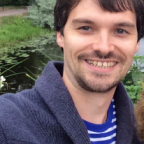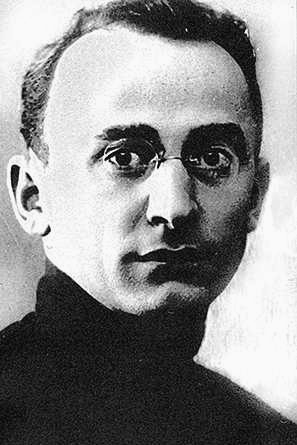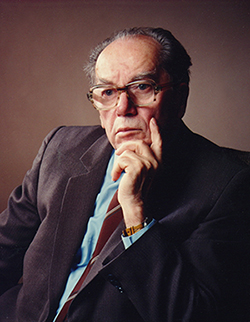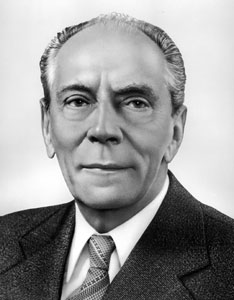For a period in the 1950s known as the Khruschev Thaw, the Soviet Republics enjoyed a brief moment of relative autonomy from the heavy handed leadership of Moscow. Latvia, a small republic on the Baltic Sea, took prime advantage of this period of liberalization under the leadership of a group called the Latvian National Communists. They saw a way forward that diverged considerably from Moscow, and took concrete steps to resist Russification of Latvia’s politics and culture. The Thaw was short lived, however, and the Latvian National Communists were eventually thwarted and the republic brought back into the Soviet fold. Guest Mike Loader gives an enthusiastic look at this high drama at the peak of the cold war, which gives us a glimpse into the inner workings of the Soviet Union from a different perspective.
Guests
 Michael LoaderPost-Doctoral Researcher, Uppsala University (Sweden)
Michael LoaderPost-Doctoral Researcher, Uppsala University (Sweden)
Hosts
 Christopher RosePostdoctoral Fellow, Institute for Historical Studies, The University of Texas at Austin
Christopher RosePostdoctoral Fellow, Institute for Historical Studies, The University of Texas at Austin
You are looking at the rise of the Latvian National communists. Let me start off by asking who and what are the Latvian National communists?
The national communists in Latvia derive from a term used in the west referring to various expressions of communism in East European countries after the war. For example, Yugoslavia and Poland. It implies the divergence from Moscow and an independent approach in the implementation of communism. In Latvia we attribute this term to a number of individuals who rose to prominence in the leadership of the Latvian Republic. Latvia– a bit of background–was reincorporated into the Soviet Union at the end of the war, 1944, and this group that emerged had known each other for a while in the army and the Komsomol—that’s the communist youth organization—and in underground work in independent Latvia. So, they had personal relations with each other in their work, and they found out that they had a common vision for what Latvia should be like. And what’s interesting is that they were not bound by age—although they were mostly young—nationality—they weren’t necessarily native to Latvia; not all of them even spent the interwar period In Latvia. But, they shared a common vision as to how Latvia should be, and almost universally they spoke Latvian.

So what was this vision of how Latvia should be?
Will all come to that in just a moment. What we need to look at first is how it all started and how this vision of emerged. So, 1953 is the key year. By this time, they were sort of middle ranking functionaries in the Latvian party and in the government. What really triggered everything, and as with most important things in Soviet history, is that Stalin died. And Stalin’s death triggered a power struggle within the Kremlin. Lavrenty Beria was the secret police chief at the time, and he tried to gain the support of the Soviet Union’s 16 republics—because the Soviet Union was nominally set up federally—by offering to address some of their grievances. These grievances included: too many Russians working and running the government, the communist party and the police etc. And his proposal was to replace them with indigenous party workers and confer official business and the working language of government and the party into the local languages. This was very popular in the republics.
And so, in Latvia this led to a plenum, which was a party meeting, organized by Beria among the inner party leaders. One after another they got up to the rostrum and they thundered about Russian chauvinism in Latvia and how we don’t have proper representation in the party, and it’s a Latvian party in name only, and it’s run by Russians. This was unprecedented. This is really the beginnings of national communism because the Latvians who got up and said all this were the people who would become the Latvian National communists. Finally, Beria lost this struggle to Nikita Khrushchev, and he was executed, and the Latvian plenum resolutions, those decisions about changing everything in Latvia, they were shelved. They weren’t repealed, they were shelved for the time being.
This goes counter to everything that the national communists were working for. So, how did they respond to this shelving of their plans?
It it all went on the back burner a little bit, and they continued to build up piecemeal. This is where we come to the second major year – there are three major years to discuss in this analysis of high politics and Soviet Latvia — and it’s 1956, which is when things really take off. So, this is where I believe that the national Communists coalesced into a proper faction. Now, I go against the grain here in my work by sticking my neck out and saying this. But see, they had special meetings with each other in their houses, they canvased for support on important votes in the top decision-making bodies in the Soviet Union, which are the Central Committee, and above that, the Bureau. The Bureau was like the U.S. or UK Cabinets. And during say a meeting of the Bureau, they would call for a break, and they would pop outside for tea, but they would actually have a chat about it, and they would all come back with a decision and vote, and they would outvote the other members. In my opinion, if this wasn’t a faction in a one party state, I don’t know what was. So, they began to promote each other up the ladder – and this is very, very crucial—they began to help each other into important positions within the leadership. So, it’s probably a time to mention that the leader, and he was a very charismatic person, his name was Eduards Berklavs, he was a very charismatic, very brash individual. He used to upset a lot of people with his way of doing things, but he was the one with the most clear vision for Latvia. This was to protect it from excessive Sovietization, and especially Russianization because they were worried about it.
That they had many members across this spectrum, in culture and in the Komsomol, in the ministries and in the departments, so I think of it really as spreading its tentacles.

So, but me tell you a little bit more about Berklavs. He had reached the position of first secretary of Riga, which was the capital of Latvia. He was the first secretary of the city party committee which makes him, effectively, the mayor by 1955. 1956 was the year of Khrushchev’s secret speech where he denounced Stalin’s crimes to the party, and the national communists were invited. Khrushchev said that he would return the party to Leninism, and he handed out copies of Lenin’s last testament to all of the audience. And Berklavs and company took the inspiration for their reforms from this and their own interpretation of Lenin as a defender of rights of the small nations within the USSR.
In 1956, Berklavs can begin to put his plans into motion. He was worried about migration, particularly. This was the biggest problem. About 12 years after the reincorporation of Latvia into the USSR, about ½ million Russians had moved to this very small Republic of only about two million people. They really were making a splash. He created a law in conjunction with his allies in the police and municipal authorities. It was a residency restriction. So, when people arrive to live in a new city in the USSR, you could live anywhere and work anywhere—a bit like the EU—you had to register with the police. But now Berklavs had the police refuse restrictions so Riga became a bit like Moscow and Leningrad, now Saint Petersburg, where you had to have a permit to live there. This reduced the flow of migrants from one or two thousands a month to practically zero.
Berklavs and his national communist colleagues were worried about the lack of use of the Latvian language. So, they he implemented a law in which all employees in the service sector had to speak both Latvian and Russian. The Latvians already knew Russian, because in order to go to university and get good jobs you had to know Russian. So, the Latvians knew Russian, but the Russians didn’t know Latvian. So, the situation was that these employees had two years to learn a conversational level of both languages or they faced losing their jobs.
I think we can imagine that this caused absolute uproar among the Russians who came to Latvian largely for a better life because there was a higher standard of living in Latvia. Not only that, the national communists picked a fight with the military. They tried to take away their summer houses on the seaside at the beach resorts and restricted their privileges in Latvia. They prioritized Latvians over Russians, which was reversing the status quo, in apartment distribution. There was a housing crisis and you had families squeezed into tiny apartments, and married couples living with their parents for 20 years.
So, the national communist minister of culture, Voldemārs Kalpiņš, struggled to reassert Latvia’s cultural heritage during the period. He had great success. He got banned books from disgraced Latvian authors approved. He got cultural festivals that Latvia loves so much—the song festivals, the opera and theaters, and he got the orchestras playing Latvian music. And even the midsummer festival which is their biggest pagan festival of lights called Lido, their most important vision—he got that back. All this Latvian culture that had been banned under the Soviets, he got reintroduced.
So, you can probably see that this was very important for them.
I can see that it was very important for them. I can also see that this is not going to sit well with Moscow.
Yes! You are absolutely correct. And so, even they can almost tolerate under the new Khrushchev era spirit and of reforms, but it really became a problem in 1958. Kruminš, Berklav’s second in command, became the second secretary of the whole of Latvia—not just Riga where Berklavs was first secretary— because this position was preserved for a Russian. This is the watchdog of Moscow, in every Republic, at every level, the second secretary was Moscow’s eyes. There was a sensational vote—I know, what are you talking about? A vote? In the Soviet Union?—But yes, there did exist a form of democracy in the USSR. We call it a democratic centralism. And what that really means, is that the upper echelon of the party, they had nominal votes which generally weren’t really exercised properly, it was just of formal way of giving their opinions. On this occasion, unprecedentedly the inner party used it to eventually install Kruminš. So this is really going to upset Moscow, I think you’ll agree. Kruminš instituted reforms to increase the number of Latvians in the party and to force businesses into the Latvian language. So what we see, do you remember those 1953 reforms I told you about?
—Of course—
—Those are being brought back in now, off the shelf, and being instituted. So tough, he has sort of gotten the permission to do this. He’s in the top, he’s in a position of responsibility. So I told you that the national communists by this time had their fingers and every poly, they have their editors of the press, in all the economic planning organizations.
Finally, before we go on to how it all goes wrong, the national communist wanted to remove the impetus for people to migrate. Remember we talked about migration as one of the key problems for the Latvian national communists. So their brilliant scientist ideologue, Pauls Dzerve, came up with a plan to rationalize the Latvian economy. And instead of building factories making heavy industrial equipment with materials brought from Russia, and the workers brought from Russia, and the productions and back to Russia, Latvia would revert to its pre Soviets specialties. These were light industry, would industries, agriculture. This therefore would remove the need for massive numbers of Russians to come. So, as you rightly said, this upset Moscow.

This upset Moscow, yes, I can see that very clearly. So, what did Moscow do?
This is where we come to the crashing conclusion of this political thriller. By 1959 things were so far so good, as I said, the national communists were in charge. But, you see the Stalinist opposition were grouped around a man called Arvīds Pelše, and he was a Latvian. But, he lived in the USSR and he was more Russian than Latvian. He was the ideological Secretary of the Latvian party. He tried to turn back the clock. He been surreptitiously opposing the Latvian National communists for a while getting his Russian Allies in the military to write letters to Moscow complaining of nationalism. In the end, Moscow investigated it in a staged a commission sent by poachers conservative Allies and bosses in Moscow. So they all colluded, “How can we get them out?”—we’ll send a commission, and the commission will listen to them, but it’ll just listen to the aggrieved people. So, Berklavs had also put his foot in it, as he tended to do, by appealing in the press specifically to Latvians to join the party, which was dominated by Russians. He thought that if he could stack the party with Latvians in the rank and file like he did in the leadership, they could really make changes. But, this was made to be really nationalistic.
During an otherwise pleasant visit by Khrushchev, he was there for a state meeting with the Germans, culture and others convinced him that there was a nationalism afoot in Latvia. So he goes ballistic at the airports when he’s about to leave to the national communist. And then, Pelše took the queue to move. Khrushchev calmed down, he declared later, I don’t want a purge. It will cause too much trouble, and the Latvians convinced him, don’t worry we’re not going to go too far.
And they promised that they would sort it out, and put things right. But, culture had the initiative back in Riga after Khrushchev’s explosion and he scared Berklavs’ faction into disintegrating. This is probably one of the most crucial reasons as to why it all went wrong for them. They fell apart. There was no united front. Something similar happened in Lithuania, but they held together, and there was no purge. But here they fell apart, they started infighting and blaming each other and trying to keep their jobs. But Pelše had big friends in Moscow, who supported him, and he organized another plenum and he demolished everyone. They got up on the rostrum and hammered him. All Berklav’s allies, even the repentant ones, over the next three years gradually picked off, were sacked, or were given silly jobs as this major purge began.
So, let me be clear. In comparison to the people who were running the country, they were made ahead of the road construction unit out in the sticks, or manager of a bookshop for someone who was the main newspaper editor. This was a bit like Joe Biden being given the job of mayor in a small town in Idaho, or the UK chancellor being made to work in a pickle factory. It was a real humiliating downgrading strategy. And this went on into the lower ranks of the party. We think maybe two thousand lost their jobs. And Pelše did, indeed, turn back the block. Everything went back to Russian control, and it became a repressed culture.
And if we have time to conclude—
—you do! Please.—
I would say that, ultimately, the epilogue to this great history is that Pelše got the top spot. He won the First Secretary position, he got the old doddering guy who was playing neutral out for failing to keep the peace. He went on to Moscow in the end, and he became a real bigwig. But, it helped Latvians hold on to their cultural heritage and their language, and reminded them about it, and they were able to resist Russification quite effectively. In the end, they became independent again when the Soviet Union collapsed in 1991. At that time, the National Communists, elderly men by this time, thirty years later, they re-emerged from obscurity, and they became involved in the independence struggle.
The ultimate legacy of this Russian migration to Latvia is that it’s led to around 700,000 Russians and Slavs, Russians, Ukrainians and Byelorussians out of a country of just two million people. This causes ethnic tensions right up to this day, not as acute as in Ukraine, but present.